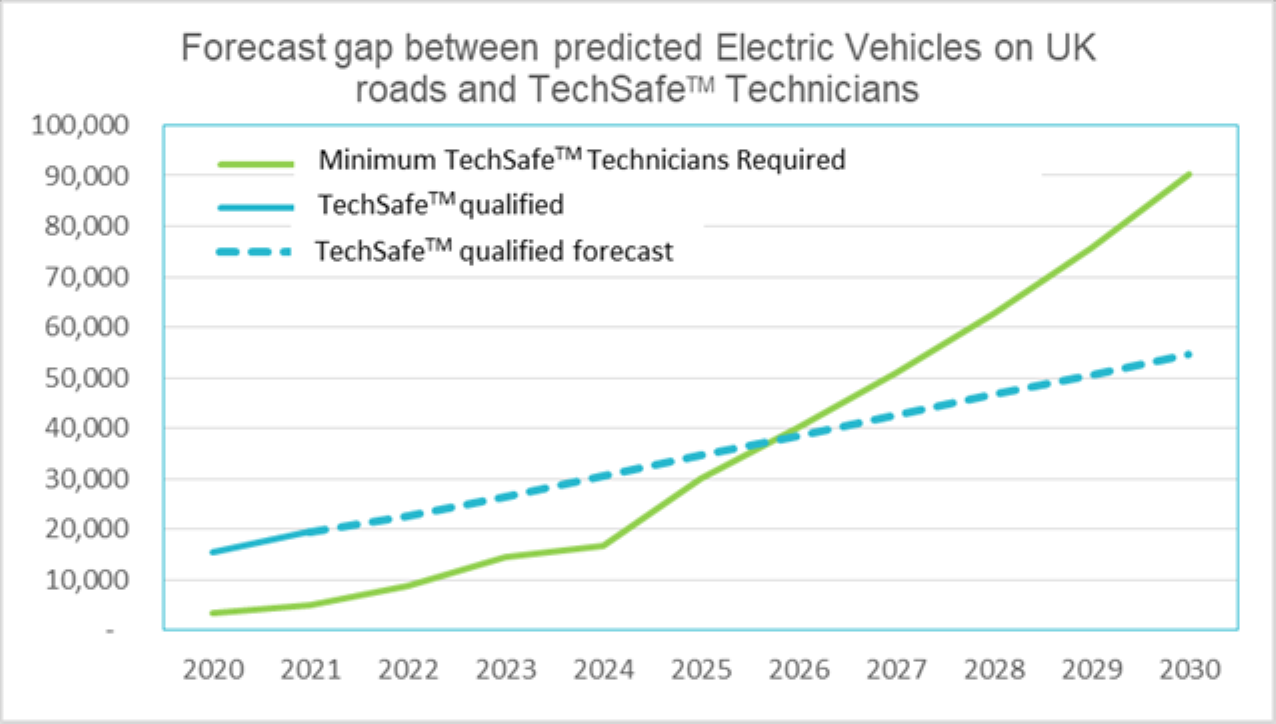Can we keep EVs on the road?
A lack of investment in training technicians could short circuit the move to EVs
The UK faces an electric vehicle (EV) skills gap.
Institute of Motor Industry believes there will be too few technicians to service the volume of zero emissions vehicles predicted to be on UK roads by 2030.
They believe 90,000 technicians will be required to provide a sufficient workforce. 2030 is the deadline for the Government’s Road to Zero deadline. All new cars can only be EV’s by that point.
Training to meet demand
The automotive sector is working to retrain and, because of the accelerated adoption of EVs. However, the IMI is predicting that there will be a shortfall of 35,700 technicians by 2030. In fact, the skills gap will be evident by 2026.
Steve Nash, CEO of the Institute of the Motor Industry, explained: “As of 2020, there were 15,400 qualified TechSafe technicians in the UK. That number represents just 6.5% of the UK automotive sector and was already giving us cause for concern.
“Our new analysis paints an even more challenging picture. The pace of EV adoption is accelerating, even while the issues around infrastructure remain a barrier.
Investing in the future
With a growing charging network and greater affordability of EVs, we need to be able to service and repair EVs. “The next big challenge will be how to ensure we have a workforce adequately qualified to provide the essential servicing, maintenance and repair to keep these vehicles safe on the roads. And that’s where we believe Government attention – and funds – should be focused now.”
Plug-in cars are expected to account for more than a fifth (21.5%) of all new car registrations next year. That’s according to the Society of Motor Manufacturers and Traders (SMMT). New plug-in vehicle uptake rates have accelerated rapidly. More EVs will join Britain’s roads in 2021 than during the whole of the last decade, says the SMMT.
A total of 271,962 new BEVs and PHEVs were registered between 2010 and 2019. However, the SMMT now expects around 287,000 of the latest zero-emission capable cars to be bought during 2021 alone. That equates to one in six new cars. BEV registrations are also expected to exceed those of diesel by the end of 2022.
Time management
The rise is even more remarkable given that 2021’s weak sales of new cars. At present it is 30% below the average recorded over the past decade.
But with this comes new opportunities and careers. Nash believes there need to be “a mind-shift in how to fix the widening skills gap”. But he is concerned the government is not investing in this area of development. He is calling for “significant investment” and that “without a skilled workforce, it will fail in its decarbonisation ambitions.”

Current trends
As of 2020 there were 15,400 qualified technicians. Using current forecast trends, by 2030 there could be a shortfall of 35,700 qualified technicians. This could undermine safety and consumer confidence.
The forecast also indicates that the gap could materialise as soon as 2026. This would risk the Government’s 2030 green ambitions.
It is suggesting a £15 million boost would play a critical role. This could contribute towards training for up to 75,000 technicians. In the context of the £1.9 billion investment committed by Government in the 2020 Spending Review, it is a “modest figure”.
It would make a significant difference, particularly for the independent sector which historically has less training opportunities compared to the franchise network which is supported by manufacturer academies, with the result that consumers will have less choice, says the IMI.
“The Government wants the adoption of EV to continue at a pace. The investment in EV charging needs to be matched by an investment in EV skills training to help employers ensure the workforce is EV-ready and electrified motoring doesn’t come at a premium.”





